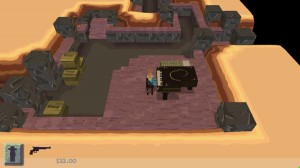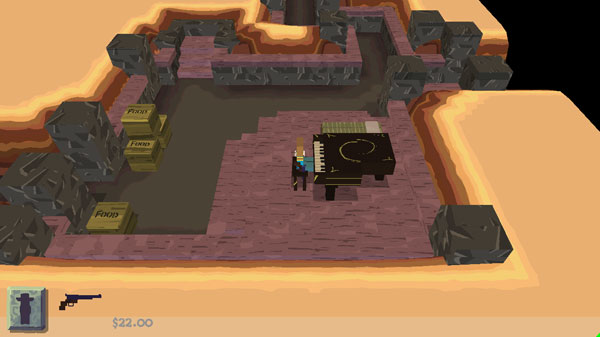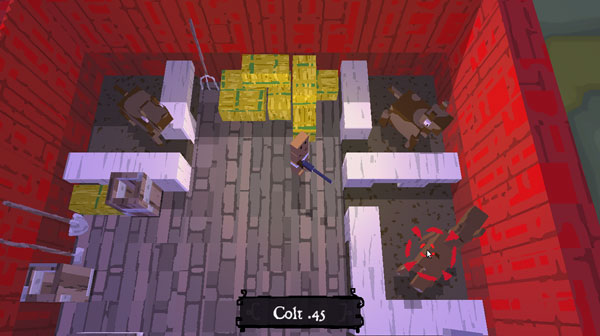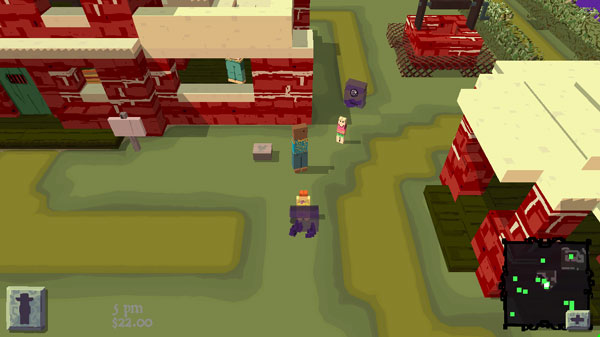 What happens when you mix The Legend of Zelda with Ultima 6? Indie game developer Calvin French answered that question with the creation of The Real Texas, a game that’s been five years in the making. The Real Texas is now available for Windows, Mac and Linux PCs over at his site. We sat down and had a small chat with him…
What happens when you mix The Legend of Zelda with Ultima 6? Indie game developer Calvin French answered that question with the creation of The Real Texas, a game that’s been five years in the making. The Real Texas is now available for Windows, Mac and Linux PCs over at his site. We sat down and had a small chat with him…
Q1. Why did you decide to make this game? How long did it take to develop? Has this become your “day job?”
Calvin French: The game started as an experiment with a user interface system. So I originally had in mind to just create something very simple. However it quickly expanded from there. It took about 5 years all told to make, and I’d say until about year 2 or 3 there wasn’t really a “master plan.” In the end I was able to pull a lot of different threads together into something I hope is meaningful and also makes a certain amount of logical sense.
I guess the main thing is that after personally living in the Texas purgatory universe for so long, and being so familiar with the characters, it took on a live of it’s own. The characters were one of the first things I put in so I had a lot of time to get used to it.
Based on sales of the game I have been able to quit my day job, so that’s great. While I was making it, I worked half-time as an indie developer and half-time as a database administrator and web developer. I was lucky to have a well-paying job with a lot of flexibility, but it’s been nice to just do game stuff full time.
Q2. What are your thoughts on preproduction? Do you plan everything out or go straight to prototyping?
CF: My thoughts on preproduction is that it’s well worth it to have a core theme and also core mechanics in mind, but don’t go overboard. If you have absolutely no plan, you’ll be all over the place and it will take a very long time to reign it in (however, the results of this can be interesting– it’s just costly!) With Texas, I ought to have planned out a little more, but then, I lacked the experience to really do this effectively so I can’t have too many regrets.
However: if you have too much of a plan, or you stick to it too solidly, or you idealize your game mechanics, then you’ve just taken it too far in the opposite direction, in my opinion.
What I mean I guess is, have a plan, but don’t feel you need to stick with it. Let the game take on a life of it’s own as you are building it, and don’t be afraid to make huge changes as they come to mind. Something magical happens when an idea goes from being in your head, to physically in the computer. Don’t stifle that magic by trying to bend it to something it just has decided that it doesn’t want to be.
Q3. You have a wide selection of freeware that you used; how did you decide on what to use?
CF: I really like working on Linux. I like the freedom from walled gardens (even gentle ones) and also the ability to be easily multiplatform, yet native. OpenGL + SDL will get you on almost any platform. XNA and other technologies are (I’m sure) fabulous, but then you are implicitly discouraged from porting your games to other platforms. You can see this with XNA or DirectX games and also with iOS games that never jump to anything else. I think that’s too bad.
Over the years I have developed a way of working that lets me transition more or less seamlessly between Linux, Windows and Mac OS X. I know what to expect on all three, and my tools have really not so far let me down.
In terms of the non-programming tools I use, it’s mainly GIMP for textures and other graphics work, and sfxr for sound effects. GIMP is essentially a FOSS photoshop “clone”, as you may know. I’m not sure if there are better alternatives, but the main reason for using GIMP over another tool is chiefly just the cost. Adobe products I’m sure are great but I’ve never really had the means to buy them, and now I am so familiar with GIMP that it doesn’t seem to make sense to learn something else. I’ve been using GIMP for as long as I’ve been using linux, which would be at least 10 years.
sfxr is extremely important, because sound design takes on a life of it’s own only when you have enough variety of sounds. Generally what I find, and what other people have said as well, is that once you start filling in sound effects, it starts to become very apparent which ones are missing. Every action that has a certain physicality to it will ideally have a matching sound effect. So for instance, opening a drawer in The Real Texas is not animated, but it feels very real because there is a special sound effect for it. All in all there are more than 500 separate sound effects in the game. Working on my own, sfxr lets me get a huge variety of different sounds in very quickly. I actually made a modification to sfxr to allow it to dump .wav files from .sfxr files from the command line, as well as running a compressor (not file size but acoustical compressor, to level the sounds out) automatically. This speeds up production a lot.
All 3D models are made in software. The most involved is the revolver and other guns which have something like 500 lines of code to define their physical shape. Most objects have much smaller programs, for instance a table is really just a few dozen lines of code. From this code I can easily define many types of tables. I mention this just because I do not use any 3D modeler at all. In the past I have used Blender, which is a really fantastic tool, even when I used it (5 years ago). However much like recording custom foley sounds would be, 3D modeling quickly gets out of hand in terms of the time spent. So for Texas I decided early on that all objects would be procedural. It was slow going at first but by the time I was finished I had a really good method of working, and of course once you have a program for a table or chair or whatnot you just reuse that program whenever you need a new type of said object, tweaking the parameters such as thickness, height, length and width and texture appropriately.
I should mention lua, as well. Most of the game is actually in lua with the underlying time-sensitive code mostly in C++. Lua is just a great, properly abstract high level language that integrates very easily with C/C++ so it’s a great choice. Something like python would probably also work well but lua is decidedly lightweight compared to python (which has it’s advantages as well as it’s drawbacks.)
Q4. Your game is up on Steam Greenlight; what are your feelings on the $100 fee?
CF: Ugh! I don’t know how to feel about it. Honestly my biggest concern with Greenlight stems more from the available time that actual bedroom coders will have to dedicated to a PR platform. If you ask me, although Steam can be an excellent avenue for indies (as is borne out many times) I don’t think it’s a silver bullet. So I realize I’m not answering specifically on the $100 fee, but think of it this way: as an indie, you should be a bit serious about raising money in order to support your game making (don’t make games to get rich though, that will basically just make you miserable.) So the point is, should you spend time and effort (and $100) on Greenlight, when other avenues (GamersGate, Desura, and others) are possibly just happy to look at your game and help you get selling it today? If your whole business plan is “get on Steam” you likely need a more flexible business plan, and one that you can control.
I think the bigger issue is maybe to do with unfinished games. There is, I think, a large disconnect between developers or potential developers, and players who maybe perceive the process of how a game comes together as much lower-risk than it is. Sometimes very “complete” seeming demos are a long way from release, and so having these projects on Greenlight probably dilutes those games which are more legitimate, by which I mean are finished today =) Of course this is also a potential problem with kickstarter, but on the other hand it’s cool to see that some of these games are now being finished, which is really amazing and cool! (case in point FTL of course)
So I guess I would say, if the $100 is a lot of money to you, well, look at other avenues than Steam/Greenlight. Don’t be afraid to JUST SELL YOUR GAME FOR MONEY. Bug press people to cover it, sometimes they might not get back to you right away but you know what, these people do love covering and writing about games and they are human beings. And you’ll maybe be surprised that people will gladly fork over 5 or 10 or even 15 smackeroos for your game, and if you put love into what you do, players will get it.
So, how I feel is I’d rather spend time, energy and money on things I can control. I’d love to be on Steam, obviously, and more than that a lot of players have said, “can you get this on Steam?” and so I want to provide that avenue; others have asked for Desura and so the game will be there, too. And right now Valve is trying out Greenlight, and I think they have good intentions (sorry– I don’t really buy those who rant that they are just “crowdsourcing” the vetting process, out of laziness; I really think it’s more to do with trying to develop community involvement which is great.) So yeah! Complicated feelings on the matter, and don’t ask how I feel about kickstarter– hahaha! =)
To other devs though I’d say, one lesson I had to learn, is don’t pin all your hopes for success on one thing or another. Really just get out there and do those things you can do, and don’t waste too much time on those things you really just don’t control.
Q5: McPixel recently received a lot of good press because of how he dealt with The Piratebay. What are your thoughts on piracy?
CF: Genius-level marketing. What Sos said specifically was that, sometimes you can’t afford games, and so well– if you can’t TPB is there for you. Technically I think his promotion was PWYW but distributed through TPB torrents or something. Anyhow I think this (affordability) is definitely a good attitude to have, too. So I think what he did was very cool and he had a huge success with it, too!
But on the whole piracy is a complicated issue and I feel more than one way on the matter. As a developer, it’s not good to get too stressed out over it, on the whole. I guess it falls into the “stuff you can’t control” category.
I know some people are avidly pro-piracy, but personally I think copyright is a progressive law. I guess I would say you can’t be pro-piracy and pro-copyright but maybe that’s not true, I don’t know. Honestly I don’t follow it very closely, like, I don’t read much in the way of opinions on it and truthfully I don’t pirate in any meaningful sense of the word. But I’m not really judgemental of those who do, I guess I just don’t care that much about it! I know people who are avid pirates and for them it’s kind of like, a hobby? Like they mostly just want to download stuff for the sake of having it. This is much different than like, not wanting to support the creators.
But without copyright law, big business would gladly swoop in, steal every interesting creative product, and rebrand it as their own. Big business would have the advertising power to exploit every artist in whatever way they wanted, and wouldn’t need any kind of consent at all. So for instance, you’d have Minecraft on XBLA but Mojang would be left out in the cold. The Real Texas would be offered for sale by like, well, whatever publishers wanted to sell it, but maybe I wouldn’t have gotten quit my job to make more games. Maybe people would find out about who the actual creator was and send money their way, but it seems more likely that it would be chaos, really, and mostly people just want to play their games. So big business certainly benefits from copyright law, but at the same time, so does the small guy, at least sometimes.
I mean it happens now in AAA industry where the actual creative people are hidden away, because publishers don’t want game development “stars” if they can avoid it. In this case the publishers have enough power to keep the creators somewhat anonymous, which is a shame.
On the other hand, stuff that is done to combat piracy (DRM) is just, well, terrible. Unless you count Steam as DRM, I won’t knowingly buy or install games that use DRM. Ubisoft seems to have terrible DRM these days, so I’ve not bought any of their games. Likewise Diablo III is a non-starter for me. This is my loss in a sense but I guess I’m just old-fashioned in that respect. And to be honest I didn’t quite understand the Steam subscriber agreement at first, I love the Steam service but feel I should own the games I bought. So… mixed feelings there. I think in Europe, the government has forced Steam to make it so you own the games you bought, but not in NA. Well, I could be wrong about all of this.
So with respect to what I make, well, you bought it, please play it and do whatever you want to it and then like, burn it to CD and give it to your friend. Please don’t upload it to a pirate site or try to sell it yourself, because that’s basically just not really fair. If you can’t afford it, email me and I will probably give you a free copy. Really. It’s a download but please just treat it like you would a physical copy of something. I love that. I guess if you are super honest you’ll delete your copy if you give it away, which seems right, but like, I’m not going to install malware onto your computer to make sure you can never give it away to somebody. This is insanity and it’s fundamentally disrespectful to people. Money ought to buy SOMETHING, right?






